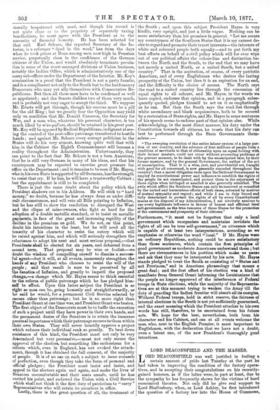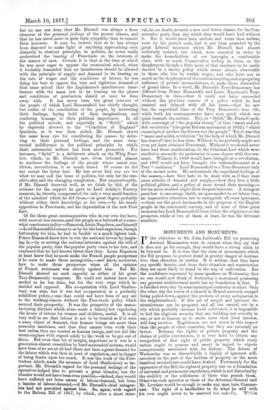LORD BEACONSFIELD AND WEE MASSES.
LORD BEACONSFIELD was well justified in feeling a certain amount of pride last Thesday at the part he had taken in improving the condition of the factory opera- tives, and in accepting their congratulations on his recently- gained honours, as if the latter were, in part at least, due to the sympathy he has frequently shown for the victims of hard economical theories. Not only did he give real support to Lord Shaftesbury, when' as Lord Ashley, he first introduced the question of a factoryry law into the Rouse of Common*, but no one can deny that Mr. Disraeli was always a keen val, he, no doubt, secured a new and better chance for the Con- servative party than any which they would have had without it. Yet it would have been useless, and worse than useless, even for his party's ends, had it not been preeeded by the great Liberal measures which Mr. Disraeli had almost uniformly resisted, but which were essential in order to make the householders of our boroughs a comfortable class, with as much Conservative feeling in them as the shopkeepers, though a little more of that tendency to be easily dazzled by a showy policy which seems always observable in those who live by weekly wages, and who have not so much as the shopkeepers of the caution-inspiring and segregating influence of private accumulations, to make them distrustful of grand ideas. In a word, Mr. Disraeli's Tory-Democracy has differed from Prince Bismarck's and Louis Napoleon's Tory- Democracy in this,—that it could not have succeeded without the previous success of a policy which he had resisted and delayed with all his force,—that he saw but the superficial lines of the Tory Democrat's true role, while both his contemporaries have seen much which was quite beneath the surface. Nay, in "Sybil," Mr. Disraeli spoke with contempt of "the popular frenzy" of that "mean and sel- fish revolution" (the great Reform movement of 1832)," which emancipated neither the Crown nor the people." Yet it was this "mean and selfish revolution "by the help of which Mr. Disraeli has done all that he has done. Without it, we probably might not even yet have obtained Free-trade. Without it we should never have had those ameliorations in the Criminal Law which were needful to reconcile the proletariat in some degree with Govern- ment. Without it, 1848 would have brought us a revolution, and 1867 would not have brought the enfranchisement of a Tory "residuum." Lord Beaconsfield is a Tory-Democrat only of the second order. He understands the superficial feelings of the masses,—how they hate to be dealt with as if they were mere articles of demand and supply,—how they love a little political glitter, and a policy of more sound than meaning,— but he never studied aright their deepest interests. A stringent poor-law to encourage thrift, an open market to set labour free, an imperative education law to extinguish all crass ignorance, —these are the great landmarks in the progress of the English people in the nineteenth century, and of none of these great measures has Lord Beaconsfield been either the originator or the promoter, while of two of them at least, he was the bitterest assailant. observer of the peisonal feelings of the poorer classes, and that he has cared more to gain their sympathy than to consult their interests. It may be, indeed, that as he has always been disposed to make light of anything approaching even distantly to abstract principles in politics, he never really understood the bearing of Free-trade on the interests of the masses of men. Certain it is that at the time at which he was most eager to oppose the economical school, when it foolishly demanded that no interference should be allowed with the principle of supply and demand in its bearing on the rate of wages and the conditions of labour, he was doing his best to oppose the wise and righteous demand of that same school that the Legislature's mischievous inter- ference with the same law in its bearing on the places and conditions of production should at once be done away with. It has never been the great interests of the people of which Lord Beaconsfield has chiefly thought, but rather of the conciliation of the people, by interesting their feelings, laying hold of their imaginations, and rendering homage to their political importance. In all his political novels, and especially in "Sybil," which he expressly devoted to the "Condition of England" Question, as it was then called, Mr. Disraeli shows the same keen eye for conciliating the masses by defer- ring to their personal feelings, and the same deep- rooted indifference to the political principles by which their substantial welfare has been most promoted. For instance, " Sybil " is a deliberate attack on the Whig Poor- law, which, as Mr. Disraeli saw, often irritated almost to madness the feelings of the people whose moral con- dition, nevertheless, it so much raised. Of course he did not accept the latter fact. He has never had any eye for what we may call the bone of politics, but only for the sen- sitive skin and the changing complexion. But unquestionably, if Mr. Disraeli deserved well, as we think he did, of the artisans for the support he gave to Lord Ashley's Factory measure, he thereby compensated for only a very small fraction of the mischief which he did them,—in great degree probably without either their knowledge or his own,—by his steady opposition to Free-trade, and his depreciation of the new Poor Law.
Of the three great contemporaries who in our own day have, with more or less success, used the people as a bulwark of a some- what reactionary policy—Bismarck, Louis Napoleon, and himself —LordBeaconsfield seems to us by far the leastsagacious, though fortunately for him, he had to buckle to a much lighter task. Prince Bismarck knew how to win the national favour by despis- ing it,—by so serving the national interests, against the will of the popular party, that the popular party came to his feet, and confessed that he had known better than they. Louis Napoleon at least knew that he must make the French people prosperous if he were to make them manageable,—and knew, moreover, how to make them prosperous when all the opinion of French statesmen was utterly against him. But Mr. Disraeli showed no such capacity as either of his great Tory-Democratic compeers. He could not indeed have suc- ceeded as he has done, but for the very steps which he derided and opposed. His co-operation with Lord Shaftes- bury was wise, but it was but co-operation in a perfectly
subsidiary policy,—one that could not have been of any use to the working-classes without the Free-trade policy which secured their prosperity. It was the prosperity of the manu- facturing districts which alone made a factory law regulating the hours of labour for women and children, useful. It is all very well to see that labour is not to be treated as if it were a mere object of demand, that human beings are more than muscular machines, and that they cannot even work their best unless they are treated as human beings, and not fed like steam-engines with regard solely to the work to be got out of them. But even that bit of insight, important as it was in a nerat1on almost overridden by hard economical notions, would have been of no use at all had there not been a great demand for the labour which was thus in need of repletion, and in danger of being drawn upon too much. It was the work of the Free- traders which made the measure of Lord Shaftesbury so im-
portant. Mr. Disraeli's regard for the personal feelings of the
operatives helped him to prevent a great blunder, but the blunder would not have been even possible,—indeed, they would
have suffered not from excess of labour-demand, but from !t famine of labour-demand,—if Mr. Disraeli's chief antagon- ists had not prevailed against him. So, again, with regard to the Reform Bill of 1867, by which, after a short inter- but no one can deny that Mr. Disraeli was always a keen val, he, no doubt, secured a new and better chance for the Con- servative party than any which they would have had without it. Yet it would have been useless, and worse than useless, even for his party's ends, had it not been preeeded by the great Liberal measures which Mr. Disraeli had almost uniformly resisted, but which were essential in order to make the householders of our boroughs a comfortable class, with as much Conservative feeling in them as the shopkeepers, though a little more of that tendency to be easily dazzled by a showy policy which seems always observable in those who live by weekly wages, and who have not so much as the shopkeepers of the caution-inspiring and segregating influence of private accumulations, to make them distrustful of grand ideas. In a word, Mr. Disraeli's Tory-Democracy has differed from Prince Bismarck's and Louis Napoleon's Tory- Democracy in this,—that it could not have succeeded without the previous success of a policy which he had resisted and delayed with all his force,—that he saw but the superficial lines of the Tory Democrat's true role, while both his contemporaries have seen much which was quite beneath the surface. Nay, in "Sybil," Mr. Disraeli spoke with contempt of "the popular frenzy" of that "mean and sel- fish revolution" (the great Reform movement of 1832)," which emancipated neither the Crown nor the people." Yet it was this "mean and selfish revolution "by the help of which Mr. Disraeli has done all that he has done. Without it, we probably might not even yet have obtained Free-trade. Without it we should never have had those ameliorations in the Criminal Law which were needful to reconcile the proletariat in some degree with Govern- ment. Without it, 1848 would have brought us a revolution, and 1867 would not have brought the enfranchisement of a Tory "residuum." Lord Beaconsfield is a Tory-Democrat only of the second order. He understands the superficial feelings of the masses,—how they hate to be dealt with as if they were mere articles of demand and supply,—how they love a little political glitter, and a policy of more sound than meaning,— but he never studied aright their deepest interests. A stringent poor-law to encourage thrift, an open market to set labour free, an imperative education law to extinguish all crass ignorance, —these are the great landmarks in the progress of the English people in the nineteenth century, and of none of these great measures has Lord Beaconsfield been either the originator or the promoter, while of two of them at least, he was the bitterest assailant.



































 Previous page
Previous page